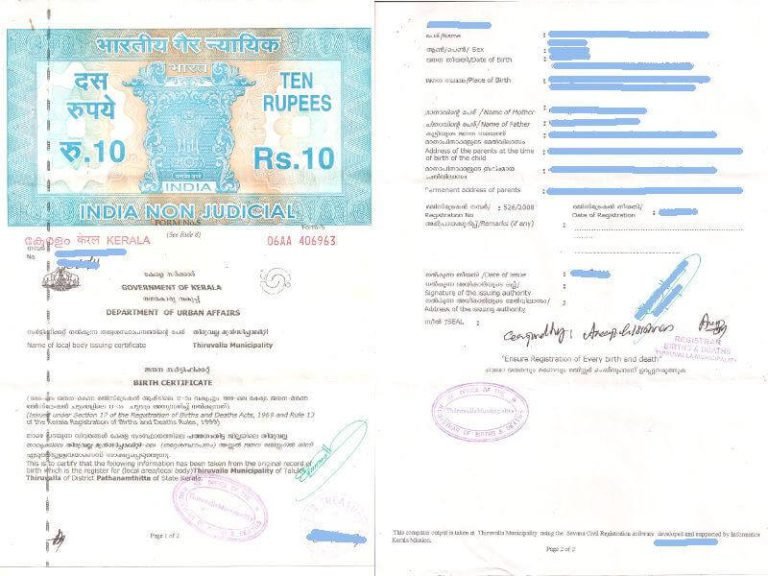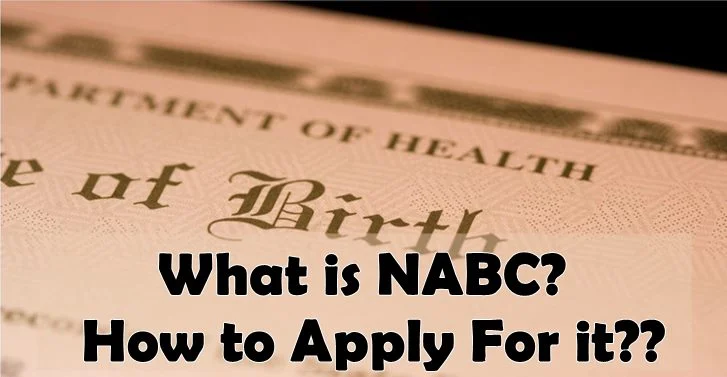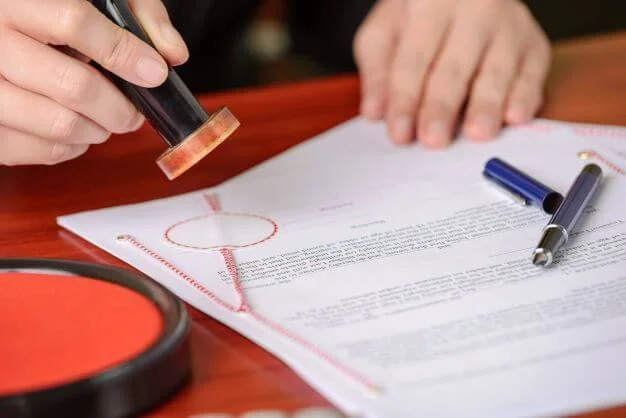Power of Attorney (PoA) | Property Transfer Act | The Conveyance Deed |
Encumbrance Certificate | E-Stamping | Possession Certificate |
Partition Of Deed
A Partition Deed is a legal document that divides the joint property between co-owners or family members, ensuring that each of them gets their rightful share. It is generally used in situations where there is a dispute among the co-owners or family members regarding the ownership or distribution of the joint property.
Easy Process and Documentation
Required Paperwork
- Identity proof of all the parties involved
- Property documents
- Sale deed or gift deed, if applicable
- Any other related documents such as property tax receipts or mutation documents.
Process, Service Charges, Time duration
- When you send us your paperwork, our experienced staff will review your paperwork with local government officials to determine the service’s cost, feasibility, and completion date. After a quote has been given, it remains fixed. Location affects project duration and cost. Send us your documents and specific requirements to get a price and turnaround estimate.
- On an average Procurement takes four to six weeks.
2000+ locations Served
Happy Clients 50000+
Averge Google Rating 4.9
India's Most Trusted Legal Documentation Portal
The majority of properties in India are co-jointly held, which can lead to disagreements amongst the owners. You may solve this issue by having a partition deed drafted, a legal document that spells out the specific shares and rights of each owner. A verbal deed is also possible, but it is not significant until it is recorded in writing. You can sue if you’re dissatisfied with the action. In this post, we’ve covered the need for a partition deed, its format, how to register it, and the paperwork needed to complete it.
What is a partition deed?
A partition deed is a formal document that specifies how an owner’s interests and rights are to be divided up. Once the deed is created, it indicates that the owner has the legal right to sell, give away, or otherwise transfer ownership of the property to any other individual. The partition deed is created the majority of the time when a property that is owned jointly is going through the process of distribution. The following are some of the many outcomes that might occur when the property is being split.
Partition by mutual consent: If all of the owners of the property come to the conclusion that they want to partition the property, they can do it amicably by going to the office of the local registrar. After the deed has been recorded, each of the owners will be able to claim their portion of the land as their rightful ownership once and for all.
Partitioning without mutual consent: If there isn’t agreement from both parties, you should file a case in the appropriate court. After the legal dispute has been resolved in court, you need to have a division deed drawn up and recorded. This deed should include all of the information regarding each owner. Also, have it recorded on stamp paper as soon as possible.
- In the case of inherited property:
If the property in question is one that has been handed down from generation to generation, then each of the co-owners has the legal right to inherit and transfer the property. A partition document is an absolute need if you want to steer clear of any disagreements in the future. - Conflicts within the family around property:
If a family conflict arises during the process of property division, a legal procedure will be necessary. In this circumstance, legal action must be taken, and once the underlying concerns have been settled, the parties involved must get a division deed.
Under Hindu law, what is Partition of Property?
The Hindu Succession Act of 1956 says that if a property is “divided,” it means that when the owner dies, their children will share the property evenly, or if there is a will, the property will be divided according to the will. Also, they all think they have an equal chance of getting the house.
Read also: What is property that can’t be moved? Types of rights and the law
Why do we need a Partition Property Deed?
If there are going to be co-owners of a property, then they absolutely need to have a partition property deed drawn out. It is in everyone’s best interest to get a partition deed officially filed so that they are informed of their respective shares and rights. The procedure of registering a partition deed has to be followed in the event that all of the owners provide their approval for a partition deed. After that is completed, each of the co-owners is free to make decisions regarding their own shares on their own. You have the legal right to take legal action if the other party does not consent to the terms of the agreement.
Things to Keep in Mind When Registering a Partition Deed?
To register a partition deed, perform the following steps:-
- According to Section 17 of the Indian Registration Act, the deed needs to be registered in the office of the sub-registrar located in the same region as the immovable property.
- There are a few states that provide this information on their own websites. Online registration of the partition deed is available to you.
- Complete the deed to the division.
- Please include all of the necessary attachments in your submission.
- According to the Stamp Duty Act of 1899, you are required to pay registration fees as well as stamp duty.
- Stamp duty costs range between 2% and 3% of the total value of a split share’s property.
- You will be able to get the receipt after making the payment if the deed registration was done online.
How to Register a Deed to Partition Your Property
To register a partition deed, all you need to do is follow these few easy procedures in the right order.
Step 1: Visit the DORIS (Delhi Online Registration Information System) website.
Step 2: On the home page, click the “Deed Writer” button.
Step 3: After that, choose “Partition Deed.”
Step 4: Choose “Partition Deed” again as the type of sub deed.
Step 5: Next, you need to give the necessary information about both the first and second party for the application process to move forward.
Step 6: Give information about how much the property is worth.
Step 7: Go to the Stockholding Corporation of India website and pay the e-stamp tax and registration fees. After that, make an appointment online to go to the registrar’s office to register the split deed.
Format of Partition Deed
Following is a partition deed format :-
Partition Deed Format in English
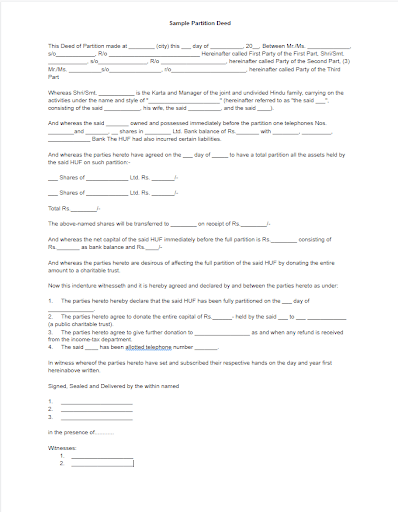
Partition Deed Format in Hindi
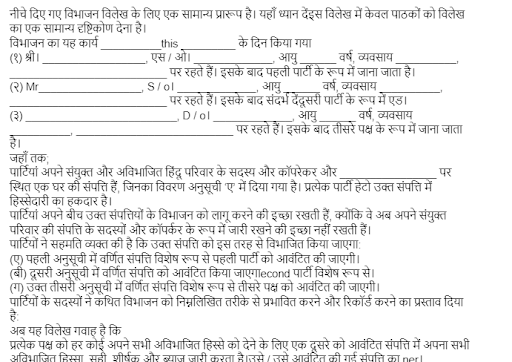
Required Documents For A Partition Deed
The following documents are required to execute a partition deed:
- Preliminary document
- Photos of co-owners that are passport size
- Duties/ Fees e-challan duty/Application Fees
- Stamp duty, and fees for handling documents
- A fact sheet on PDE
- Land records are called Khasra and Khatoni.
- Map of transferred property
- Picture of property that has been moved
- Photo ID cards for all the parties: Adhaar card, Voter ID card, Kisan id card, PAN card, Driving licence, Passport.
- If the price is more than Rs. 5 lakh, you need a PAN card.
Difference between Partition Deed and Partition Suit
A partition document is required by law when dividing property. If you and your co-owner(s) agree on a partition, you must file a partition deed. If not, you must initiate a lawsuit and request the divide from your other co-owner(s).
When you are unable to split by mutual accord, you must file a partition suit. A partition suit is filed in order to obtain a partition deed from the courts. If the aggrieved party wishes to oppose the partition suit, they must do so within three years of the date the partition action is filed.
Taxation of Income on the Partition Deed
Since there is no transaction involved in obtaining a partition deed, you are not required to pay tax on it. A beneficiary is not required to pay tax on the deed after the division of property, but capital gains tax will accrue based on the category of property.
Also see: How to Calculate India’s Capital Gains Tax on Real Estate
A Partition Deed Should We Register?
Your division deed must be registered in accordance with Section 17 of the Indian Registration Act of 1908 at the very least. By paying a stamp tax of Rs 1000, the document may be officially registered. It is important to keep in mind that unregistered deeds cannot serve as evidence for any reason whatsoever.
FAQS
The property is distributed fairly among all of the co-owners of the business or home. On the other hand, if there is any other legal documentation that indicates differently, then it can be done in accordance with that. If it is a property that was inherited, then it is dealt with in accordance with the inheritance law that is relevant to their faith.
A partition suit is when a lawsuit is filed to get the partition done, but a partition deed is a legal instrument that is prepared with mutual consent in order to get the division done.
If you are unhappy with the way the property was divided, you certainly have the legal right to contest the partition document in court. Keep in mind that you need to have a reasonable justification in order to dispute it in court.
Only if the partners have first signed a memorandum of understanding will a verbal agreement to split the property be considered valid.
You have the ability to draught a partition deed on your own; nevertheless, in order to prevent errors, you should consult with a documentation lawyer.







